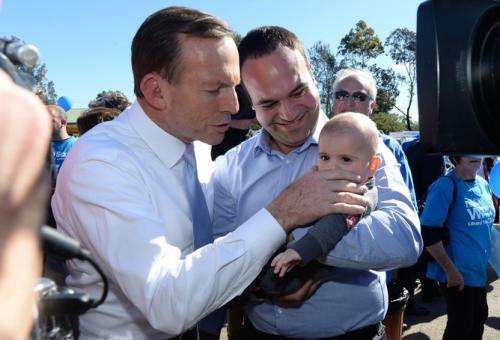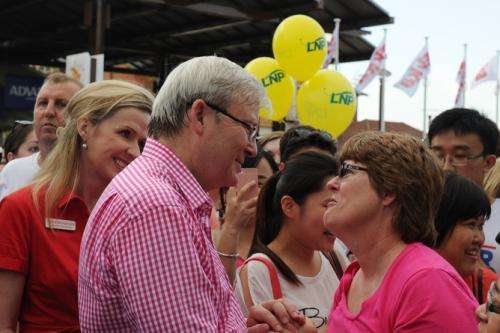What is retail politics?

Shaking hands. Kissing babies. Throwing snags on the barbie, or wandering through a suburban shopping centre. These are the familiar scenes of "retail politics", a campaign style in which candidates sell themselves and their policies by talking to as many voters as possible.
American political communication scholars Judith Trent and Robert Friedenberg, in Political Campaign Communication, define "retail politics" as being about "direct contact": meeting and talking to voters to appeal personally for their support.
This, Trent and Friedenberg argue, has two clear benefits. Firstly, meeting a political candidate makes voters feel more engaged and more likely to support the candidate, who has been "humanised" through a face-to-face meeting. More importantly, it allows for interaction. Voters can ask questions, engage with candidates, and come to feel that their concerns matter.
This may seem like an element of a "golden age" of political campaigning that has long since passed. The rise of the mass media and the centralised, professional campaign means that election campaigns are now national and presidential, appealing to the majority of the electorate while also carefully targeting voters in marginal seats.
However, most voters will never meet their local candidate, let alone one of the contenders jostling for the position of prime minister. As voters, our feelings about the personality and values of politicians develop from a mixture of media coverage, pre-existing partisan preferences, word-of-mouth and gut instinct.
However, one of the fascinating things about the evolution of professional politics is the way that candidates and campaigns harness new technology in ways that enable them to reach and meet voters. In the United States, where parties need to "get out the vote" as well as win support, online data capture, management and analysis technologies are tools of the increasingly sophisticated political ground game.

Calls for small donations from "grassroots" supporters (something Kevin Rudd emulated early in Labor's campaign) are as much about gaining a picture of your current support base as they are about financial assistance. In 2013, when Australians give $5 to Labor, or fill in their name and email address and click "join us" on the Liberal Party's website, they contribute to the picture each of the parties will use to tailor their campaign messages, appearances and appeals.
However, these new technologies are not, and cannot be, the whole story. Aggregate data on the preferences of citizens cannot replace political instinct. Information about the priorities of a particular electorate does not automatically give candidates the ability to connect with voters. This is where retail politics continues to be vital.
Retail politics, at its heart, is about visibility and availability. In 2013, this individual process is still happening, through a "mediatised" retail politics in which candidates act out the ritual of direct interaction with 'ordinary voters' for a much larger audience.
Nostalgia for a "golden age" can obscure that the personal engagement privileged by retail politics has always served a dual purpose. While connecting the candidate with an individual voter, there is a secondary audience: others who are present, those who hear about the meeting through word of mouth, and, increasingly, the broader media audience.
As citizens, we are called upon to imagine ourselves as the "ordinary" person we see in the paper or on the screen. Mediatised retail politics asks us to take comfort in the idea that the campaign is truly about us, because "out there" people just like us are expressing their views to those seeking our electoral support. We become part of what international studies professor Benedict Anderson has called an "imagined community", where we feel we belong to a national community despite never knowing or meeting most of its members.
In the 2010 election, one of the most interesting media developments was the emergence of the "televised town hall", which I have argued privileges interaction and authenticity in campaign politics. Prime minister Julia Gillard and opposition leader Tony Abbott each made appearances on the ABC television program Q&A and at "people's forums" hosted by Sky News and News Limited.
These made-for-TV town halls combine features of traditional retail politics with innovative broadcast and digital strategies. The incorporation of the #qanda Twitter feed into the live broadcast, for example, allows those at home to engage with the conversation happening on screen. In addition, questions from audience members (while carefully selected and moderated by the host) actively incorporated voter concerns into the broader campaign narrative.
If the hallmark of retail politics is that campaigning politicians speak directly to voters, answering their questions in ways that make sense to them, then televised town halls pack a double punch. The performance of the leaders at Rooty Hill RSL Club, or in the ABC studio, relies on their ability to connect to the individual person asking the question while also addressing the complex, multi-layered audience watching at home.
The first televised leaders' debate, since dismissed as a dual press conference, has led to calls for more interesting options. Rudd and Abbott have agreed to a town hall-style debate in Brisbane this week, where 100 voters will be able to ask questions of the two leaders.
As the campaign heads into its final weeks, both major parties will continue looking for innovative ways to facilitate a mediatised retail politics that responds to the changing social, technological and media landscape of campaign politics.
Provided by The Conversation
This story is published courtesy of The Conversation (under Creative Commons-Attribution/No derivatives).




















